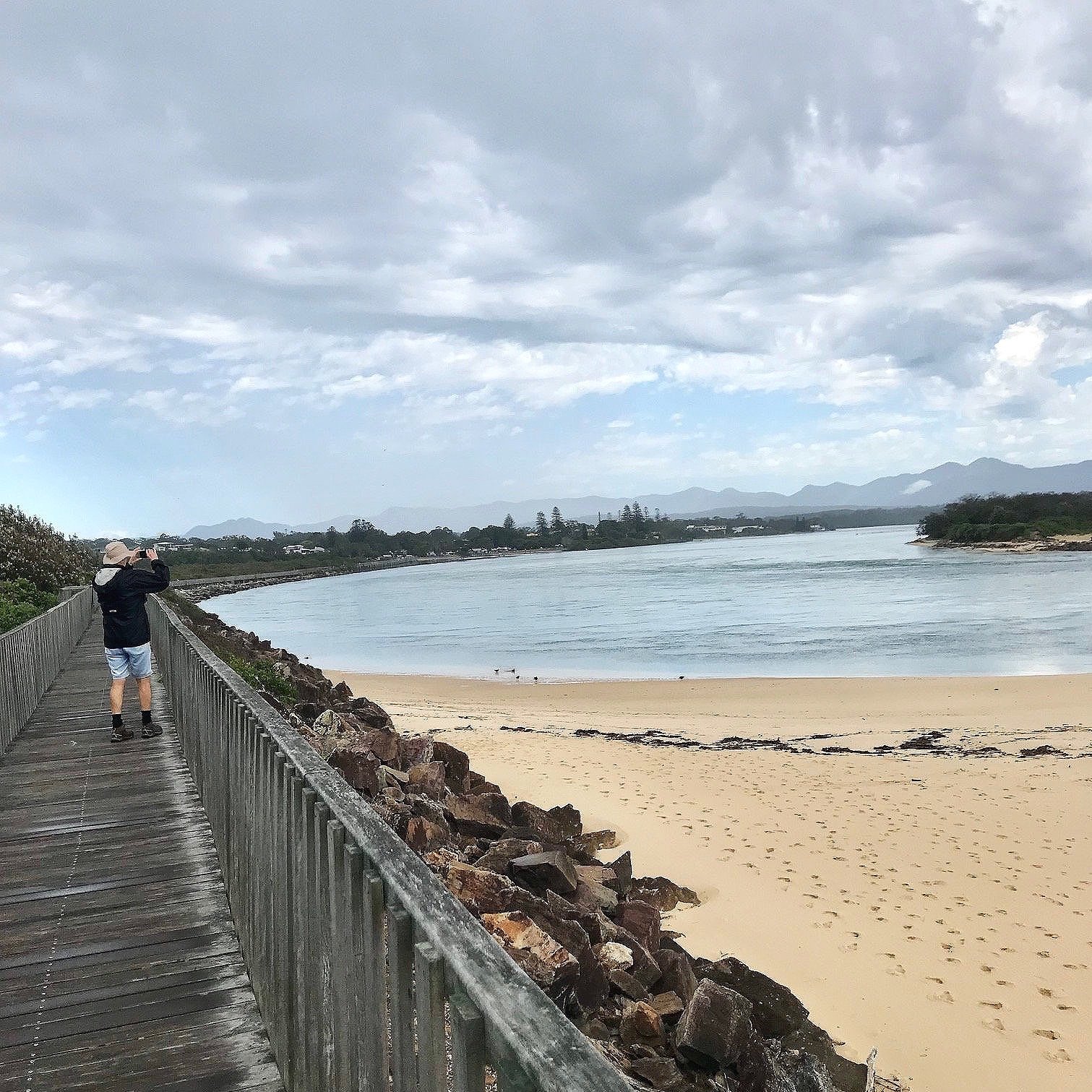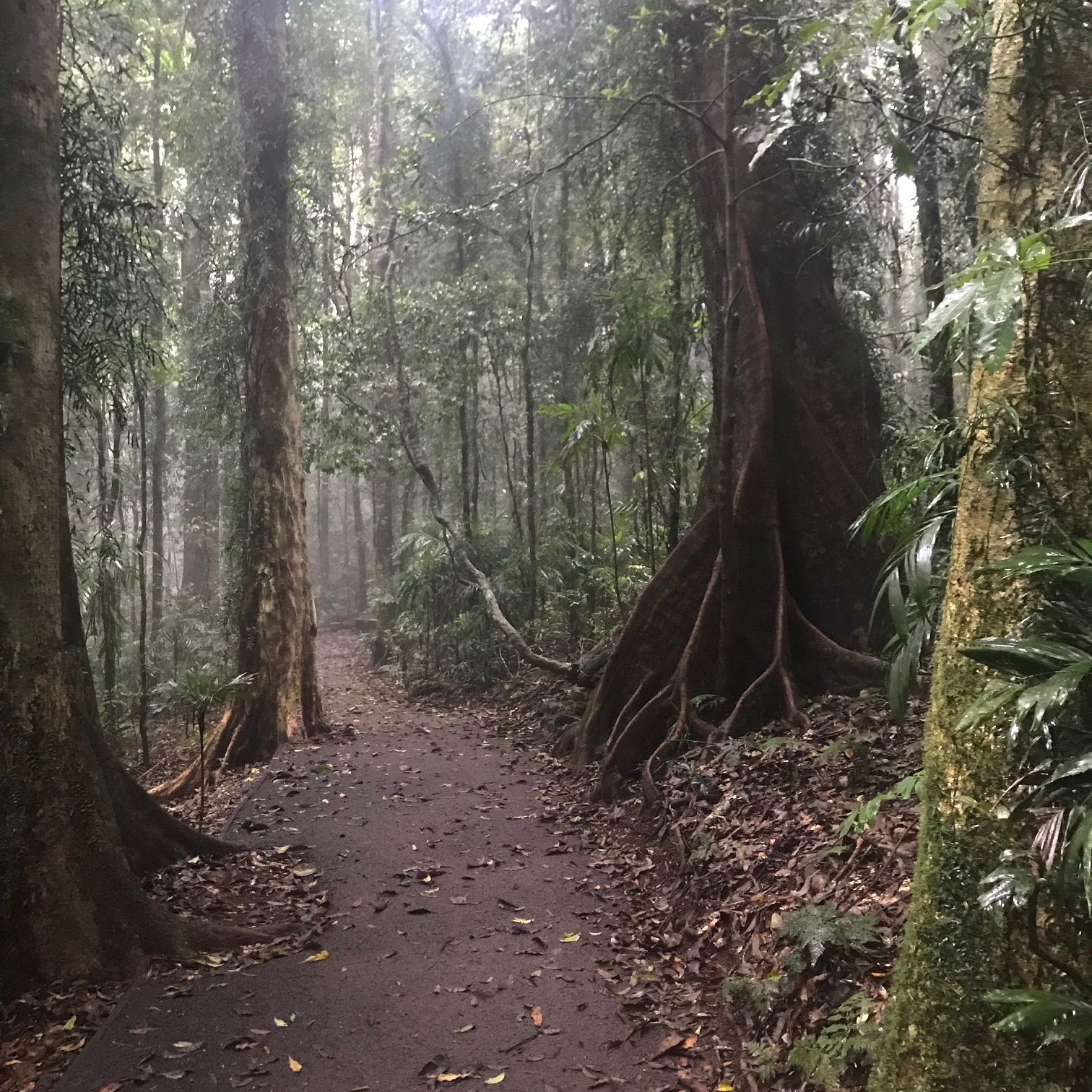Christmas in Bellingen
Have you ever travelled because of a book? Did Dracula send you to Transylvania or Monkey Grip to the Fitzroy Pool?
Those questions came to mind after re-reading Peter Carey’s Oscar and Lucinda, the book with the floating glass church on the Bellinger River, and because of that we made Christmas plans to follow fiction’s footsteps.
In a piece he wrote for The Guardian, Carey talked about his time in Bellingen, how he lived in a house perched on tree trunk legs on the banks of the flood-prone Never Never.
To inhabit that house was to live connected to this lovely gin-clear stream at the back, and the towering walls of the Dorrigo escarpment at the front. The river provided a constant song, gentle swimming holes, violent floods. The escarpment brought dancing lightning storms along its ridge.
Driving from the town of Bellingen you took the road to "the Promised Land" where you found the whole valley spread before you: the line of casuarinas tracing the course of the Never Never, the high back wall of the escarpment looming two thousand feet above, and a perfectly placed small, white clapboard church, sited a little above the river, beyond the reach of flood.
We pulled into Bellingen, New South Wales, five days before Christmas 2023, having crossed many rivers to get there: the Hastings and the Clybucca to name only two, and the Wizzenbucca Creek. It was a pilgrimage long overdue and the first thing we did after visiting friends was to search the Promised Land for that small, white clapboard church sited a little above the Never Never.
Glennifer Community Church, near Bellingen
The church that caught Carey’s eye is indeed small and perfectly placed, though no longer white. You wouldn’t think it was a literary landmark, the way it sits so quiet and unassuming, in a glade, surrounded by cow pasture emerald green, its bush backdrop towering but not overbearing.
You wouldn’t think it a site of great cultural significance, either, because it’s pretty much like every other small weatherboard church in rural Australia. But I think that’s the point. Its significance arises from its everydayness, its ubiquity and apparent innocence in a world it fundamentally altered.
Carey, in The Guardian, spoke about that small church as a box of loaded stories, told by and for the colony of cedar cutters and squatters, murderers and thieves, clergy and farmers, chancers, schemers and dreamers.
One could look across the Promised Land and know that, two hundred years before, it had been filled with Aboriginal stories. The tribes who told them were all gone, but it was a safe bet that the Never Never river was a story, that the Dorrigo escarpment was a story, that the wedgetail eagle, soaring in the updraft on the cliff face, was a story too. The valley had been a cathedral in another time. For the sake of the Christian stories, these other stories had been poisoned, shot and drowned.
Not everyone wants to walk with that knowledge. Not everyone looks at a cute little church in the Promised Land and thinks about the crimes wrought by white settlers but I’m glad Carey did because it led him to write an extraordinary book about painful truth, about a church made of glass, about obsession and colonialism and Christianity and two people magnificently odd.
Bello teems with kelpies and kookaburra and the barefoot descendants of hippies who swapped the rat race for a commune in the hinterland. The streetscape is full of charm, the natural environment is gorgeous and the community seems blessed with many people of goodwill, some of whom are prepping for yet another anti-logging campaign.
The town hosts an annual writers’ festival, several very good restaurants (Osteria Fiume was a standout) and an excellent gelato bar. The coffee at Habitat was as good as it gets. And if you happened to hear the local choir sing an acapella version of Bowie’s Starman over drinks at The Federal Hotel, you’d feel pretty damn good about where you landed.
Arriving five days before Christmas gave us time enough to day-trip to Urunga and Sawtell and Dorrigo as well as enjoy Bello itself. We walked the Urunga boardwalk, swam at Sawtell Beach, and explored the cloud-covered rainforest on the Dorrigo escarpment.
On Christmas Day we wandered the banks of the Never Never, which was a wonderful thing to do, and come Christmas night, sat on a bench on Bello’s main street, opposite the Hammond and Wheatley Emporium, whose golden age signage proclaimed: drapers, clothiers, ironmongers. The pub was closed, the wise townsfolk were all home, the kelpies fast asleep.
All was silent.
Lightning danced on the near horizon.



